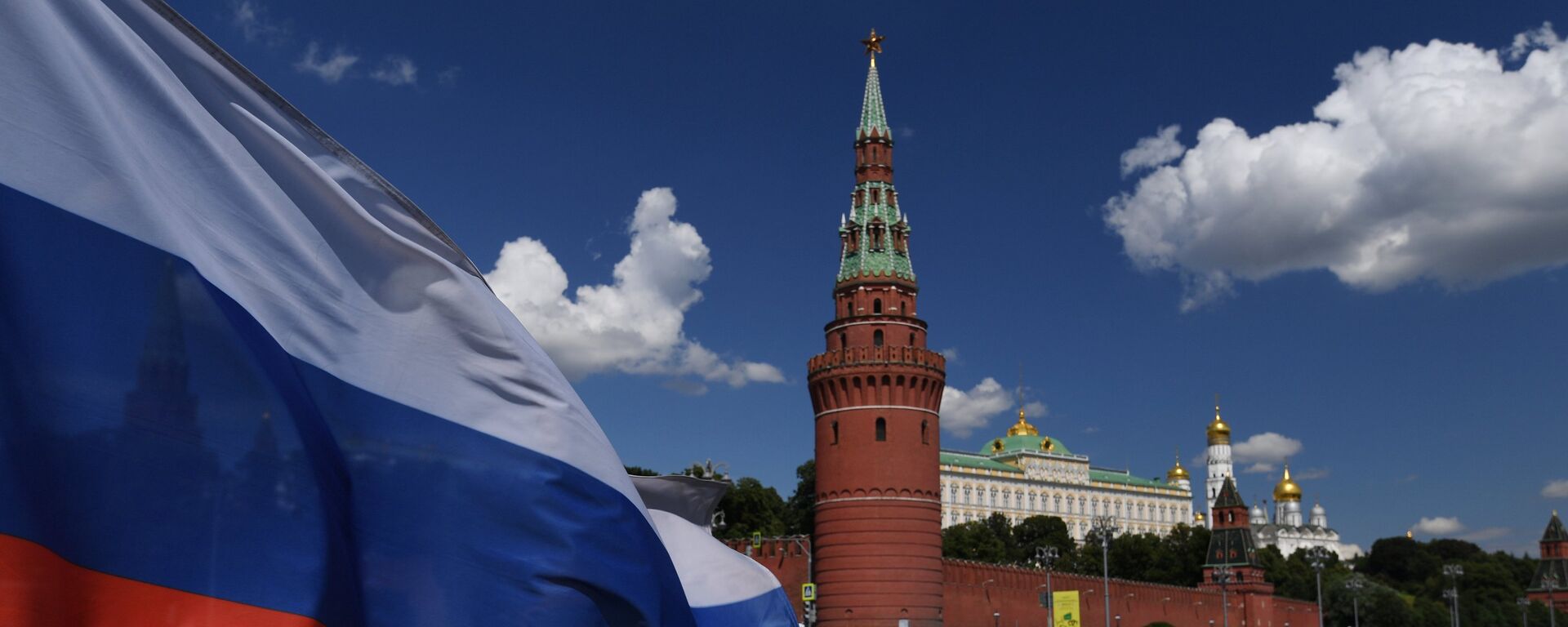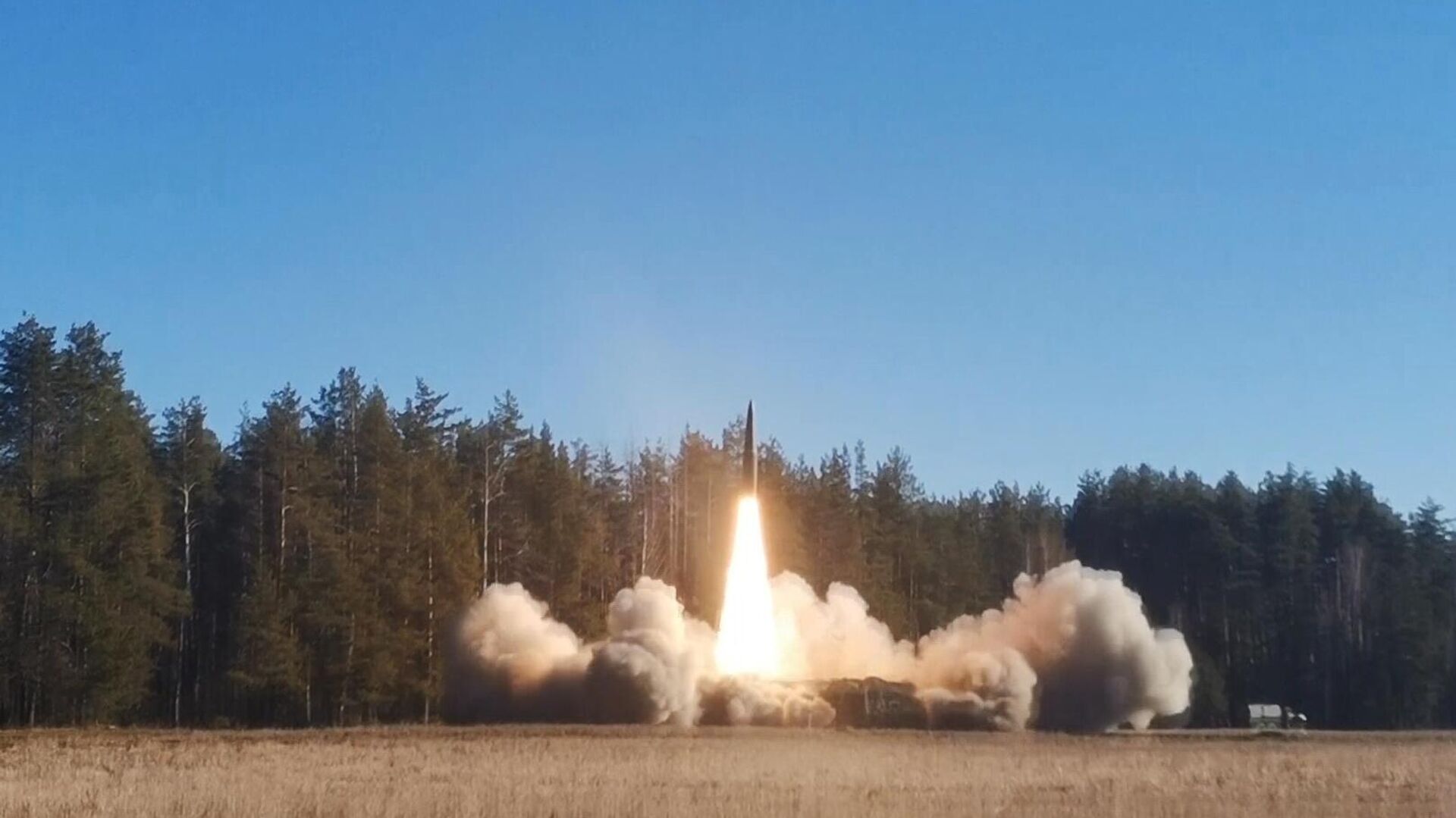https://sputnikglobe.com/20241122/pepe-escobar-oreshnik---the-3-km-per-second-plot-twist-1120965738.html
Pepe Escobar: Oreshnik - The 3 Km Per Second Plot Twist
Pepe Escobar: Oreshnik - The 3 Km Per Second Plot Twist
Sputnik International
Nothing to see here. Just a hypersonic demo. Well, not really. The average American is only capable of making (some sort of) sense of the world through movies. So let’s go back to a classic: the opening sequence of Coppola’s Apocalypse Now – the Vietnam war counterpart to Joseph Conrad’s Heart of Darkness, set in the Congo.
2024-11-22T15:59+0000
2024-11-22T15:59+0000
2024-11-22T15:59+0000
military
russia
vladimir putin
ukraine
nato
european union (eu)
army tactical missile system (atacms)
kursk
rs-26 rubezh
https://cdn1.img.sputnikglobe.com/img/07e8/04/13/1118014720_0:169:1620:1080_1920x0_80_0_0_4210c5dab771f4cf62d04b4038178982.jpg
In the movie, Captain Willard (Martin Sheen) is barely capable of enacting a drunken soliloquy alone in his room in Saigon. He’s waiting for his assignment: a special mission all the way to the Heart of Darkness (in the movie, represented by the illegal American incursion/indiscriminate bombing of Cambodia).Willard, in the V.O., barely mutters, “Every minute I stay in this room, I get weaker and Charlie gets stronger.” Charlie, out in the jungle, was how American GIs referred to the Vietcong.Cue from the “American war” – how the Vietnamese refer to it – to the US/NATO proxy war in Ukraine.What’s even more ominous is that Charlie, now, is not the Vietcong. Charlie now is nuclear, hypersonic Russia.Captain America believed it would intimidate Russkie Charlie with the “authorization” straight out of the Deep State for Ukraine to attack targets inside the Russian Federation with ATACMS.Such attacks had already happened in the past on Russia’s new territories. Still, two new ones were unleashed after the “authorization”, against Kursk and Bryansk; one with ATACMS, and the other with Storm Shadows.Then came the inevitable Russian response. What was that? New multiple hypersonics? Zeus? Superman?Deputy Chair of the Security Council, Dimitri “Unplugged” Medvedev, could not resist concise trolling; “So that’s what you wanted? Well, you’ve damn well got it!”Collective West rats were predictably scurryin' all across the spectrum after watching what was first interpreted as a RS-26 "conventional warheads package" demo.Then President Putin went on the record.Key takeaways: Western long-range weapons have been used against Russia, which retaliated with the new, medium-range, ballistic hypersonic "Oreshnik" system against the Yuzhmash factory in Dnipropetrovsk; additionally, the use of long-range weapons by the enemy cannot affect the course of the Special Military Operation (SMO).But this was the key relevant message Putin relayed to the Americans, NATO and the collective West:“We are conducting combat tests of the Oreshnik missile system in response to the aggressive actions of NATO countries against Russia. The issue of further deployment of medium-range and shorter-range missiles will be decided by us, depending on the actions of the United States and its satellites. The targets for destruction during further tests of our newest missile systems will be determined by us based on threats to the security of the Russian Federation. We consider ourselves entitled to use our weapons against the military installations of those countries that allow their weapons to be used against our facilities. And in case of escalation of aggressive actions, we will also respond decisively and in a mirror manner. I recommend that the ruling elites of those countries that have plans to use their military contingents against Russia seriously think twice about this.”Sir, would you like some hazelnut salad?The initial interpretation of this de facto game-changing move was that Russia had launched a single RS-26 Rubezh road mobile missile against the Yuzhmash missile production factory in Dnepropetrovsk, equipped with six independent, non-nuclear (italics mine) warheads, each in turn deploying other warheads (call it 6x6 = 36).That in itself changed the “essence” of the war in Ukraine, as Putin himself had previously recognized when it comes to the “authorization” for attacks by ATACMS.Putin himself also referred to “combat testing”. What is established beyond any testing, in Putin’s own words, is that “Hazelnut” may be sent as a gift to any target across NATO.Oreshnik is as badass as missiles get. It may reach the UK in only 19 minutes; Brussels in 14; Berlin in 11; and Warsaw in 8 minutes. And, of course, traveling at over Mach 10, it simply cannot be intercepted by anything in the collective West arsenal. That includes the US.High destructive power is a given – already guaranteed by the surprise factor; you only know what hits you after you get hit (maybe). One potential option is that Oreshnik targeted secret underground workshops at Yuzhmash, where NATO had sent equipment and parts for short-range ballistic missiles (500 km to 1,500 km).In his four books and in his blog, the indispensable Andrei Martyanov has made it clear that “Russia has an overwhelming conventional escalation superiority” compared to the Hegemon. So, yes: this testing of an IRCM (a conventional missile) with hypersonic MIRVs (Multiple Independent Reentry Vehicles) may be just a demo – a preview of what else may be in store.As Martyanov remarked, “this is not anymore just SMO”. Indeed: for quite a while we have been way past a special military operation: this is a do-or-die NATO v. Russia hot war. Aggravated by the fact that the Hegemon’s ruling elites are congenitally incapable of stop escalating.Even the Oreshnik demo won’t stop escalation. A plausible scenario is that US military intel learned about an impeding Russian mid-range ballistic missile strike and then informed Kiev and NATO. Moscow then warned the US 30 minutes before the strike (that’s the norm, to prevent nuclear misunderstandings); the Americans not only confirmed it, but stressed there was no risk of a Russian nuclear attack on Kiev, now or in the foreseeable future.Oreshnik in fact is a tacit demo that Russia does not need nuclear power to solve anything in the Ukrainian theater of war.So let’s assume that escalation has been controlled – for now. Yet we still have nearly two months of a completely deranged US administration in power. NATO’s congenital dementia suggests escalation will continue. The difference though is stratospheric: now they don’t know if Oreshnik handing them a business card comes with a nuclear bomb on or not.For all the inbuilt dementia of the current – exiting – administration, Americans who only understand the world via movies may have forgotten that it was Trump 1.0 who withdrew the US from the INF treaty, in 2019. If the US had remained, Russia would not have been able to develop and use Oreshnik.But now it’s hazelnut salad time, everybody; a great way to regulate blood pressure.
https://sputnikglobe.com/20241121/russias-hypersonic-oreshnik-missile-system-shows-nato-escalation-will-come-at-price---experts-1120957219.html
https://sputnikglobe.com/20241122/oreshnik-missile-shows-russias-retaliatory-power-to-western-arms-supplies-1120963123.html
russia
ukraine
Sputnik International
feedback@sputniknews.com
+74956456601
MIA „Rossiya Segodnya“
2024
Pepe Escobar
https://cdn1.img.sputnikglobe.com/img/101642/49/1016424943_868:0:3100:2232_100x100_80_0_0_a742038b05a1847ce42e71952e4994d5.jpg
Pepe Escobar
https://cdn1.img.sputnikglobe.com/img/101642/49/1016424943_868:0:3100:2232_100x100_80_0_0_a742038b05a1847ce42e71952e4994d5.jpg
News
en_EN
Sputnik International
feedback@sputniknews.com
+74956456601
MIA „Rossiya Segodnya“
Sputnik International
feedback@sputniknews.com
+74956456601
MIA „Rossiya Segodnya“
Pepe Escobar
https://cdn1.img.sputnikglobe.com/img/101642/49/1016424943_868:0:3100:2232_100x100_80_0_0_a742038b05a1847ce42e71952e4994d5.jpg
hypersonic demo, oreshnik, oreshnik ballistic missile system, oreshnik medium-range hypersonic ballistic missile system, russian hypersonic weapons, oreshnik cannot be intercepted by us or european air defenses, ukraine conflict, nato's involvement in ukraine's conflict
hypersonic demo, oreshnik, oreshnik ballistic missile system, oreshnik medium-range hypersonic ballistic missile system, russian hypersonic weapons, oreshnik cannot be intercepted by us or european air defenses, ukraine conflict, nato's involvement in ukraine's conflict
Pepe Escobar: Oreshnik - The 3 Km Per Second Plot Twist
Nothing to see here. Just a hypersonic demo. Well, not really. The average American is only capable of making (some sort of) sense of the world through movies. So let’s go back to a classic: the opening sequence of Coppola’s Apocalypse Now – the Vietnam war counterpart to Joseph Conrad’s Heart of Darkness, set in the Congo.
In the movie, Captain Willard (Martin Sheen) is barely capable of enacting a drunken soliloquy alone in his room in Saigon. He’s waiting for his assignment: a special mission all the way to the Heart of Darkness (in the movie, represented by the illegal American incursion/indiscriminate bombing of Cambodia).
Willard, in the V.O., barely mutters, “Every minute I stay in this room, I get weaker and Charlie gets stronger.” Charlie, out in the jungle, was how American GIs referred to the Vietcong.
Cue from the “American war” – how the Vietnamese refer to it – to the US/NATO proxy war in Ukraine.
The American Empire is now a drunken Captain facing the (revamped) jungle – as qualified by that stupid Spaniard Borrell, the exiting EU foreign policy “chief”. Every minute Captain stays in his decrepit garden – the counterpart to a seedy room in Saigon - Charlie, out in the jungle, gets stronger.
What’s even more ominous is that Charlie, now, is not the Vietcong. Charlie now is nuclear, hypersonic Russia.
Captain America believed it would intimidate Russkie Charlie with the “authorization” straight out of the Deep State for Ukraine to attack targets inside the Russian Federation with ATACMS.
Such attacks had already happened in the past on Russia’s new territories. Still, two new ones were unleashed after the “authorization”, against Kursk and Bryansk; one with ATACMS, and the other with Storm Shadows.
Then came the inevitable Russian response. What was that? New multiple hypersonics? Zeus? Superman?
Deputy Chair of the Security Council, Dimitri “Unplugged” Medvedev, could not resist
concise trolling; “So that’s what you wanted? Well, you’ve damn well got it!”
Collective West rats were predictably scurryin' all across the spectrum after watching what was first interpreted as a RS-26 "conventional warheads package" demo.
Then President Putin
went on the record.
Key takeaways: Western long-range weapons have been used against Russia, which retaliated with the new, medium-range, ballistic hypersonic "Oreshnik" system against the Yuzhmash factory in Dnipropetrovsk; additionally, the use of long-range weapons by the enemy cannot affect the course of the Special Military Operation (SMO).
But this was the key relevant message Putin relayed to the Americans, NATO and the collective West:
“We are conducting combat tests of the Oreshnik missile system in response to the aggressive actions of NATO countries against Russia. The issue of further deployment of medium-range and shorter-range missiles will be decided by us, depending on the actions of the United States and its satellites. The targets for destruction during further tests of our newest missile systems will be determined by us based on threats to the security of the Russian Federation. We consider ourselves entitled to use our weapons against the military installations of those countries that allow their weapons to be used against our facilities. And in case of escalation of aggressive actions, we will also respond decisively and in a mirror manner. I recommend that the ruling elites of those countries that have plans to use their military contingents against Russia seriously think twice about this.”

21 November 2024, 19:04 GMT
Sir, would you like some hazelnut salad?
The initial interpretation of this de facto game-changing move was that Russia had launched a single RS-26 Rubezh road mobile missile against the Yuzhmash missile production factory in Dnepropetrovsk, equipped with six independent, non-nuclear (italics mine) warheads, each in turn deploying other warheads (call it 6x6 = 36).
That in itself changed the “essence” of the war in Ukraine, as Putin himself had previously recognized when it comes to the “authorization” for
attacks by ATACMS.
Putin’s speech established that Russia in fact used a completely new medium range (1,000 to 3,000 km) missile, the Oreshnik (“Hazelnut). Even US officials admitted it’s an “experimental” system; that implies they knew something about it.
Putin himself also referred to “combat testing”. What is established beyond any testing, in Putin’s own words, is that “Hazelnut” may be sent as a gift to any target across NATO.
Oreshnik is as badass as missiles get. It may reach the UK in only 19 minutes; Brussels in 14; Berlin in 11; and Warsaw in 8 minutes. And, of course, traveling at over Mach 10, it simply cannot be intercepted by anything in the collective West arsenal. That includes the US.
High destructive power is a given – already guaranteed by the surprise factor; you only know what hits you after you get hit (maybe). One potential option is that Oreshnik targeted secret underground workshops at Yuzhmash, where NATO had sent equipment and parts for short-range ballistic missiles (500 km to 1,500 km).
In his four books and in his blog, the indispensable Andrei Martyanov has made it clear that “Russia has an overwhelming conventional escalation superiority” compared to the Hegemon. So, yes: this testing of an IRCM (a conventional missile) with hypersonic MIRVs (Multiple Independent Reentry Vehicles) may be just a demo – a preview of what else may be in store.
Martyanov: “NATO has zero capability to stop Russia's long-range fires.” The “demo” also happens to be paired with a new shot at making war a relatively civil affair: Moscow will warn civilians of any impending Oreshnik strike. Those that won’t leave will do so at their own peril.
As Martyanov remarked, “this is not anymore just SMO”. Indeed: for quite a while we have been way past a special military operation: this is a do-or-die NATO v. Russia hot war. Aggravated by the fact that the Hegemon’s ruling elites are congenitally incapable of stop escalating.
Even the
Oreshnik demo won’t stop escalation. A plausible scenario is that US military intel learned about an impeding Russian mid-range ballistic missile strike and then informed Kiev and NATO. Moscow then warned the US 30 minutes before the strike (that’s the norm, to prevent nuclear misunderstandings); the Americans not only confirmed it, but stressed there was no risk of a Russian nuclear attack on Kiev, now or in the foreseeable future.
Oreshnik in fact is a tacit demo that Russia does not need nuclear power to solve anything in the Ukrainian theater of war.
So let’s assume that escalation has been controlled – for now. Yet we still have nearly two months of a completely deranged US administration in power. NATO’s congenital dementia suggests escalation will continue. The difference though is stratospheric: now they don’t know if Oreshnik handing them a business card comes with a nuclear bomb on or not.

22 November 2024, 10:56 GMT
For all the inbuilt dementia of the current – exiting – administration, Americans who only understand the world via movies may have forgotten that it was Trump 1.0 who withdrew the US from the INF treaty, in 2019. If the US had remained, Russia would not have been able to develop and use Oreshnik.
But now it’s hazelnut salad time, everybody; a great way to regulate blood pressure.





